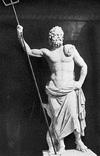- Poseidon
-
/poh suyd"n, peuh-/, n.1. the ancient Greek god of the sea, with the power to cause earthquakes, identified by the Romans with Neptune.2. Mil. a 34-foot (10-m), submarine-launched U.S. ballistic missile with up to 10 warheads and a range of 2800 miles (4502 km).
* * *
His brothers were Zeus and Hades. When the three brothers deposed their father, the kingdom of the sea fell by lot to Poseidon. Unpredictable and sometimes violent, he was also god of earthquakes, and he was closely associated with horses. Most of his offspring were giants and savage creatures. By Medusa he was the father of the winged horse Pegasus. The Isthmian Games were held in his honor. In art he was often shown holding a trident and accompanied by a dolphin and tuna. The Romans identified him with Neptune. Poseidon, marble statue from Melos, 2nd century BC; in the National Archaeological Museum, Athens.Alinari-Art Resource/EB Inc.
Poseidon, marble statue from Melos, 2nd century BC; in the National Archaeological Museum, Athens.Alinari-Art Resource/EB Inc.* * *
in Greek religion, god of the sea and of water generally; he is to be distinguished from Pontus, the personification of the sea and the oldest Greek divinity of the waters. The name Poseidon means either “husband of earth” or “lord of the earth.” Traditionally he was a son of Cronus, an ancient chief god, and Rhea, a fertility goddess, and was brother of Zeus, the chief god, and Hades, god of the underworld. When the three brothers deposed their father, the kingdom of the sea fell by lot to Poseidon. His weapon was the trident, but it may originally have been a long-handled fish spear.Poseidon was also the god of earthquakes, and many of his oldest places of worship in Greece were inland. He was, in addition, closely associated with horses (horse). He was the father of the winged horse Pegasus by the winged monster Medusa. Most scholars agree that Poseidon was brought to Greece as the god of the earliest Hellenes, who also introduced the first horses to the country.Although Poseidon lost a contest for sovereignty over Attica to the goddess Athena, he was also worshiped there, particularly at Colonus, as hippios (“of horses”). Elsewhere he was associated with freshwater springs. Poseidon was the father of Pelias and Neleus by Tyro, the daughter of Salmoneus, and thus became the divine ancestor of the royal families of Thessaly and Messenia. Otherwise his offspring were mostly giants and savage creatures, such as Orion, Antaeus, and Polyphemus. The general view of his character was violent.The chief festival in Poseidon's honour was the Isthmia (Isthmian Games), the scene of famous athletic contests, celebrated in alternate years near the Isthmus of Corinth. His character as a sea god became the most prominent in art, and he was represented with the attributes of the trident, the dolphin, and the tunnyfish. The Romans, ignoring his other aspects, identified him as sea god with Neptune (q.v.).* * *
Universalium. 2010.
